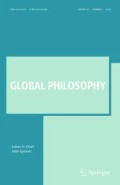Abstract
This paper examines Hume’s formulations and uses of the conceivability principle (abbreviated as CP: Whatever is conceivable is possible) and the inconceivability principle (abbreviated as ICP: Whatever is inconceivable is impossible). In Hume’s works, we identify different versions of CP and ICP, including proper CP, proper ICP, the weak versions of CP and ICP, the epistemic versions of CP and ICP, and show that Hume not only expresses ICP, but also really maintains it. Assuming an axiomatic characterization of modalities, we argue that if there is a sharp distinction between levels of modalities, then Hume’s conceivability arguments do not hold. But, in a rather different way, we also argue that if Hume’s conceivability arguments hold, then there should be no distinction between levels of modalities. Finally, we argue that after Hume, there are lots of endeavors in logic and philosophy to distinguish different levels of modalities, and to accept new concepts of necessity other than logical necessity.
Similar content being viewed by others
References
Casullo A (1979) Reid and Mill on Hume’s maxim of conceivability. Analysis 39(4):212–219
Chen Bo (2005) Philosophy of Logic [in Chinese]. Peking University Press, Beijing.
Dohrn D (2010) Hume on knowledge of metaphysical modalities. In: Meixner U, Newen A (eds) Logical analysis and history of philosophy, Volume 13, David Hume: epistemology and metaphysics. Mentis, Paderborn, pp 39–59
Garrett D (2008) Hume’s theory of ideas. In: Radcliffe ES (ed) A companion to Hume. Blackwell Publishing, Oxford, pp 41–57
Gendler TS, Hawthorne J (eds) (2002) Conceivability and possibility. Oxford University Press, Oxford
Hartmann N (1938, 2013) Possibility and actuality. Walter de Gruyter, Berlin, 2013 (Translation by Alex Scott and Stephanie Adair of Möglichkeit und Wirklichkeit, 1938)
Hetherington SC (1991) Conceivability and modal knowledge. In: Horowitz T (ed) Thought experiments in science and philosophy. Rowman & Littlefield, Lanham
Hume D (1935) Dialogues concerning natural religion. Clarendon Press, Oxford. For example, citation DNR 2.12 appears in the Dialogue, part two, paragraph twelve
Hume D (1938) An abstract of a treatise of human nature 1740: a pamphlet hitherto unknown. At the University Press, Cambridge. For example, citation A 27 appears in the Abstract, Paragraph twenty-seven
Hume D (1975) A treatise of human nature. edited by L. A. Selby-Bigge, 2nd edn. revised by P. H. Nidditch, Clarendon Press, Oxford. For example, citation T 1.3.14.31 appears in the Treatise, book one, part three, section fourteen, paragraph thirty-one
Hume D (2000) An enquiry concerning human understanding. edited by Tom L. Beauchamp, Clarendon Press, Oxford. For example, citation EHU 7.29 appears in the Enquiry, part seven, paragraph twenty-nine
Kail P (2003) Conceivability and modality in Hume: a lemma in an argument in defense of skeptical realism. Hume Stud 26(1):43–61
Lightner DT (1997) Hume on conceivability and inconceivability. Hume Stud 23:113–132
Powell L (2013) How to Avoid Misreading Hume’s Maxim of Conceivability. Philos Q 63(250):105–119
Putnam H (1992) Realism with a human face. Harvard University Press, Cambridge
Read R, Richman KA (eds) (2000) The New Hume Debate. Routledge, London
Woudenberg RV (2006) Conceivability and modal knowledge. Metaphilosophy 37(2):210–221
Funding
Funding was provided by the National Social Science Fund (China) (Grant No. 17ZDA024).
Author information
Authors and Affiliations
Corresponding author
Additional information
Publisher's Note
Springer Nature remains neutral with regard to jurisdictional claims in published maps and institutional affiliations.
Rights and permissions
About this article
Cite this article
Chen, B., Liu, J. Hume’s Conceivability Arguments Reconsidered. Axiomathes 29, 541–559 (2019). https://doi.org/10.1007/s10516-019-09422-5
Received:
Accepted:
Published:
Issue Date:
DOI: https://doi.org/10.1007/s10516-019-09422-5



